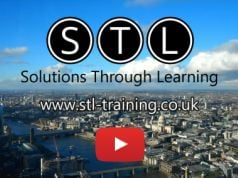98.7% Of all customers recommend us, we're so confident about our results we publish all reviews and stats
View Live Stats View Reviews
 NLP at Work
NLP at Work
Face to face / Online closed & onsite training. Restaurant lunch included at STL venues.
- 1 day Instructor-led workshop
Essentially, it helps us become everything we can be and encompasses the very essence of excellence. By modelling on those who display the behaviours you seek in yourself, it is then that you start to see a difference in your experience: behaviours and situations that once were difficult to manifest now become easier to access.
Syllabus
Who is this course for?
NLP at Work is for anyone who wants to take control of their situations, both personal and at work. Anyone who procrastinates can find out why, anyone who needs to strategise or work together in teams can recognise how to understand and communicate well with the members of the group, anyone who wants to understand their own motivations and why they do things will benefit from learning some of the recognised patterns NLP uncovers. Whether you are a newcomer to NLP or have some practice with it, there is something for you here.
Benefits
- A direct introduction to NLP in the workplace.
- Thought-provoking concepts and practices which make you see things from a new perspective and therefore change frustrating or long-term situations.
- Learn how to use these patterns to help team members self-develop.
Please be aware that you will be working on other delegates and they, too, with you. Some catalytic moments may present themselves.
Course Syllabus
The meta model
How to recognise unique styles and behaviour patterns,
What is your inner personal representational system?
Using predicates of Speech
The essence of modelling excellence
Keys to non-verbal behaviour and language
Using questioning skills appropriately
Use of NLP in various contexts
Ways in which we can build relationships
Enlarging your ability to communicate
Resolving conflicts
Recognising the behaviours of the other party in Negotiations
Achieve goals more quickly
Leadership Management and Review
Developing your skills
Use of Metaphors
Phrasing questions properly
The Swish technique
Reframing
Time Lines
What you get
"What do I get on the day?"
Arguably, the most experienced and highest motivated trainers.
Face-to-face training
Training is held in our modern, comfortable, air-conditioned suites.
Lunch, breaks and timing
A hot lunch is provided at local restaurants near our venues:
- Bloomsbury
- Limehouse
Courses start at 9:30am.
Please aim to be with us for 9:15am.
Browse the sample menus and view joining information (how to get to our venues).
Refreshments
Available throughout the day:
- Hot beverages
- Clean, filtered water
- Biscuits
Online training
Regular breaks throughout the day.
Learning tools
In-course handbook
Contains unit objectives, exercises and space to write notes
24 months access to trainers
Your questions answered on our support forum.
Training formats & Services
Training Formats & Services
Training formats available
|
Training manual sample
Below are some extracts from our NLP at Work manual.
The Meta model
Understanding and effectively utilising the
Meta model can significantly enhance understanding, improve problem solving, enhance
communication and feedback, resolve conflicts, and provide clearer thinking; leading
to a more productive and effective workplace.
The Meta Model is a set of linguistic
patterns designed to identify and challenge distortions, generalisations, and omissions
(‘deletions’), especially in communication.
Important points are;
Challenging Generalisations
Universal Quantifiers: Words like “always,”
“never,” “everyone,” “no one,” etc.
These often indicate overgeneralisations.
Challenge them by asking for specific examples.
Example: If a trainee says, “I can never
understand this material,” you might respond, “Never?
Can you think of a time when you understood
at least part of it?”
Clarifying Deletions
Unspecified Nouns: Words that lack
specificity, such as “they,” “it,” “people,” etc.
Ask for clarification to gain a clearer
understanding.
Example: If someone says, “They don’t
listen to me,” ask, “Who specifically doesn’t listen to you?”
Nominalisations: Verbs turned into nouns
(e.g., “decision,” “communication”) that imply a static condition. Turn them
back into processes to understand the dynamics involved.
Example: Instead of accepting “The decision
was made,” you might ask, “Who decided and how was the decision made?”
Uncovering Distortions
Mind Reading: Assuming you know what others
are thinking or feeling without evidence.
Challenge these assumptions by asking how
they know.
Example: “She doesn’t like my ideas.” You
could ask, “How do you know she doesn’t like your ideas? Did she say that?”
Cause and Effect: Statements implying one
thing directly causes another without clear evidence.
Ask about the connection between the two.
Example: “If I fail this test, my career is
over.” Ask, “How does failing this test affect your entire career?”
Exploring Lost Performative:
Value Judgments: Statements that convey an
opinion as if it were a fact, often missing the person making the judgment.
Example: “This method is ineffective.” Ask,
“According to whom?” or “Who says this method is ineffective?”
Restoring Deleted Information:
Comparative Deletions: Statements comparing
two things without specifying the reference points.
Example: “This process is better.” Ask,
“Better compared to what?”
Simple Deletions: When crucial information
is left out.
Example: “I am upset.” Ask, “Upset about
what specifically?”
Addressing Presuppositions:
Assumptions within Statements: Statements
that assume certain things to be true, often embedded within questions or
declarations.
Example: “Why is this so difficult for me?”
Challenge the assumption by asking, “What makes you think it is difficult for
you?”
Thanks. Your download will begin shortly.
Please help us
Share or create a link to this manual today!
Just follow these simple instructions...







